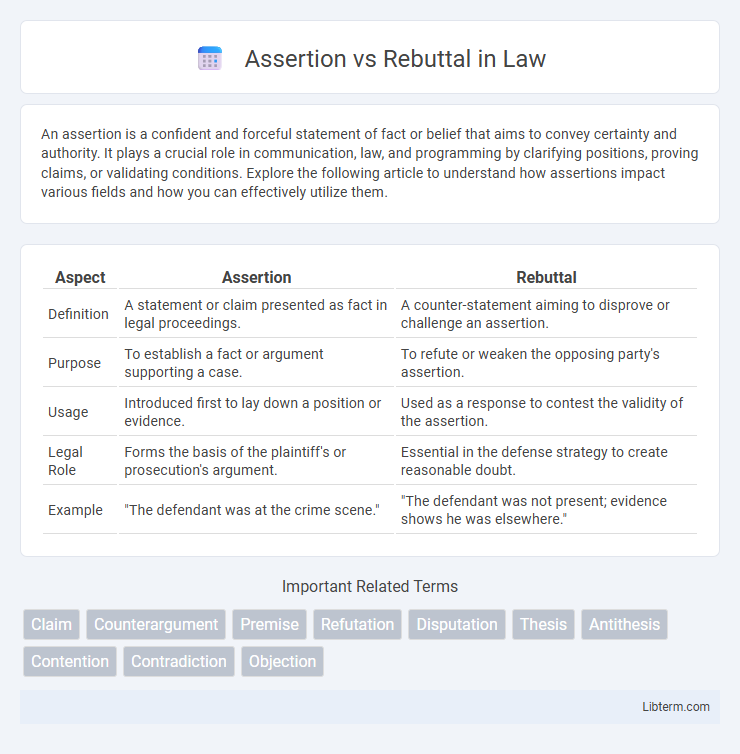An assertion is a confident and forceful statement of fact or belief that aims to convey certainty and authority. It plays a crucial role in communication, law, and programming by clarifying positions, proving claims, or validating conditions. Explore the following article to understand how assertions impact various fields and how you can effectively utilize them.
Table of Comparison
| Aspect | Assertion | Rebuttal |
|---|---|---|
| Definition | A statement or claim presented as fact in legal proceedings. | A counter-statement aiming to disprove or challenge an assertion. |
| Purpose | To establish a fact or argument supporting a case. | To refute or weaken the opposing party's assertion. |
| Usage | Introduced first to lay down a position or evidence. | Used as a response to contest the validity of the assertion. |
| Legal Role | Forms the basis of the plaintiff's or prosecution's argument. | Essential in the defense strategy to create reasonable doubt. |
| Example | "The defendant was at the crime scene." | "The defendant was not present; evidence shows he was elsewhere." |
Introduction to Assertion and Rebuttal
Assertion presents a clear, concise claim supported by evidence or reasoning, establishing the foundation of an argument. Rebuttal directly addresses and challenges an assertion by providing counter-evidence or reasoning to weaken or refute the original claim. Understanding assertion and rebuttal is essential in critical thinking, debate, and persuasive writing for constructing balanced and well-supported arguments.
Definition: What is an Assertion?
An assertion is a confident and forceful statement of fact or belief presented without immediate evidence or proof. It serves as a foundational claim in arguments, expressing a particular position or opinion. Assertions often require support through reasoning or evidence to be persuasive in debates or discussions.
Definition: What is a Rebuttal?
A rebuttal is a critical response that challenges or refutes an opposing argument by presenting counter-evidence or reasoning. It aims to weaken the validity of the original assertion by highlighting flaws, inconsistencies, or alternative perspectives. Effective rebuttals enhance persuasive discussions by addressing and undermining objections within debates, legal arguments, or academic discourse.
Key Differences Between Assertion and Rebuttal
Assertion presents a clear statement or claim supported by evidence or reasoning, establishing a specific point in an argument. Rebuttal directly challenges or disproves an assertion by providing counter-evidence or logical reasoning to undermine the original claim. The key difference lies in their roles: assertion initiates a stance, while rebuttal aims to refute or weaken that stance.
Importance of Assertion in Argumentative Writing
Assertion serves as the foundational claim or position in argumentative writing, providing clarity and direction for the entire argument. It establishes the writer's stance, guiding the development of supporting evidence and logical reasoning. A strong assertion ensures coherence and persuasiveness by clearly articulating the main point that the rebuttal will directly address.
Role of Rebuttal in Strengthening Arguments
The role of rebuttal in strengthening arguments lies in its ability to directly address and counter opposing viewpoints, enhancing the credibility and depth of the original assertion. By systematically dismantling counterarguments, rebuttals demonstrate critical thinking and provide evidence that reinforces the validity of the primary claim. Effective rebuttals contribute to a more persuasive and balanced argument, making the overall position more resilient against criticism.
Common Techniques for Crafting Strong Assertions
Strong assertions rely on clear, concise language supported by credible evidence such as statistics, expert testimony, or factual data, which enhances their persuasive power. Incorporating specific examples and logical reasoning helps to reinforce the claim, making it more difficult to refute. Emphasizing relevance to the audience's values and anticipating potential counterarguments strengthens the assertion's overall impact in a debate or written argument.
Effective Strategies for Formulating Rebuttals
Effective strategies for formulating rebuttals involve identifying the core claim of the assertion and presenting clear evidence that challenges its validity or logic. Using precise, relevant examples and addressing potential counterarguments strengthens the rebuttal's impact by demonstrating critical thinking and thorough analysis. Emphasizing factual accuracy and maintaining a respectful tone helps to persuade the audience while preserving credibility.
Real-world Examples of Assertion vs Rebuttal
In legal trials, an assertion might be a plaintiff claiming breach of contract, while the rebuttal involves the defendant presenting evidence that the contract terms were fulfilled. In scientific debates, a researcher's assertion that a new drug is effective can be rebutted by peer-reviewed studies highlighting contradictory results or side effects. Political debates often feature candidates asserting policy benefits, met with rebuttals citing historical data or expert analyses disproving those claims.
Conclusion: Balancing Assertions and Rebuttals in Discourse
Effective discourse requires balancing assertions and rebuttals to strengthen arguments and enhance understanding. Assertions present clear, evidence-based claims that drive the conversation forward, while rebuttals critically evaluate opposing views, fostering critical thinking and refining ideas. In conclusion, integrating both elements cultivates a dynamic dialogue that promotes intellectual rigor and mutual respect.
Assertion Infographic

 libterm.com
libterm.com